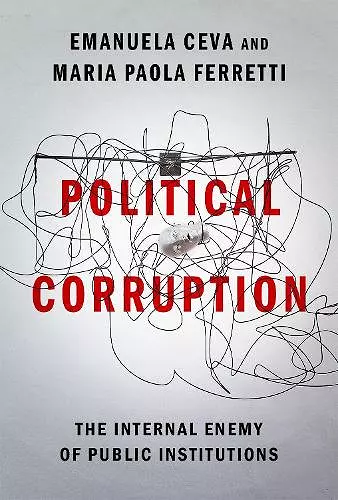Political Corruption
The Internal Enemy of Public Institutions
Emanuela Ceva author Maria Paola Ferretti author
Format:Hardback
Publisher:Oxford University Press Inc
Published:28th Sep '21
Should be back in stock very soon

From the spread of kleptocracy in Venezuela at the expense of the country's economy, to President Trump's appointment of family members to high-ranking White House positions, to President Lukashenko's desperate stranglehold on power in Belarus, across the world political corruption is rampant--indeed practically too ubiquitous to keep track of. As these examples illustrate, political corruption is often associated to a variety of instances of abuse of power that either derive from a vicious trait of individual character, or develop within deeply dysfunctional institutions. To Emanuela Ceva and Maria Paola Ferretti, however, this piecemeal view is inadequate: individual and institutional instances of political corruption have a common root that we can understand only by treating corruption and anticorruption as a matter of a public ethics of office. Political corruption is the Trojan horse that undermines public institutions from within via an interrelated action of officeholders. Even well-designed and legitimate institutions can veer off track if the officeholders fail through their conduct to uphold a public ethics of office accountability. This book offers an analytically rigorous definition of political corruption. It also investigates the common normative root of its two manifestations--corrupt individual character, and corrupt institutional mechanisms--as a relationally wrongful practice that consists of an unaccountable use of the power of office by officeholders in public institutions. From this perspective, political corruption must be understood from within, for it is an internal enemy of public institutions that can only be opposed by mobilizing the officeholders to remain accountable and mutually answerable for their conduct. In this way, anticorruption calls on the officeholders' responsibility to work together to maintain an interactively just institutional system.
This timely, wonderful book illuminates the many faces of political corruption, from the 'bad apple' to the dysfunctional institution, through the unified framework of a public ethics of office. Emanuela Ceva and Maria Paola Ferretti's incisive philosophical analysis of political corruption as a deficit of office accountability reconciles the phenomenon's individual and institutional dimensions. The authors elucidate the deontic wrong of political corruption in terms of an 'interactive injustice,' which consists of officeholders' violation of their duty of office accountability, and identify the practice of answerability as the key to fostering an organizational culture of anticorruption. Political Corruption's deeply significant contribution to political theory and public ethics is needed now more than ever. * Candice Delmas, Associate Professor of Philosophy and Political Science, Northeastern University *
Political Corruption: The Internal Enemy of Public Institutions offers an original account of political corruption which aims to understand how political corruption works and what is wrong with it. Restoring office accountability serves as a key focus which can help reorient anti-corruption efforts. This impressive work is essential reading for theorists interested in understanding why political corruption is problematic and how we might aim to combat it. * Gillian Brock, Professor of Philosophy, University of Auckland, New Zealand *
In this highly original study of political corruption, Ceva and Ferretti ask us to reflect on the wrong of corruption by looking beyond both individualist and structural accounts of institutional responsibility. Their analysis of corruption as an unaccountable use of the power conferred by holding public office is a crucial inter-disciplinary intervention. The book is essential reading for both an adequate diagnosis of the phenomenon, and identifying appropriate responses to it. * Lea Ypi, Professor of Political Theory, London School of Economics *
Ceva and Ferretti have written an important book on how we should understand political corruption. * Paul M. Heywood, Review of Politics *
Ceva and Ferretti provide rich, comprehensive, and thought-provoking answers to the question of what political corruption-understood as corruption that occurs in public institutions-is and when and why it is morally wrong. * Alice el-Wakil, Review of Politics *
Ceva and Ferretti's book offers an innovative account of political corruption as "a form of unaccountable use of entrusted power". * Chiara Destri, Review of Politics *
Ceva and Feretti's new book is a careful, well-organised exposition of a rigorous and wide-ranging new theory of political corruption. It deserves careful attention from other corruption theorists. * M. E. Newhouse, Criminal Law and Philosophy *
ISBN: 9780197567869
Dimensions: 147mm x 211mm x 23mm
Weight: 363g
232 pages